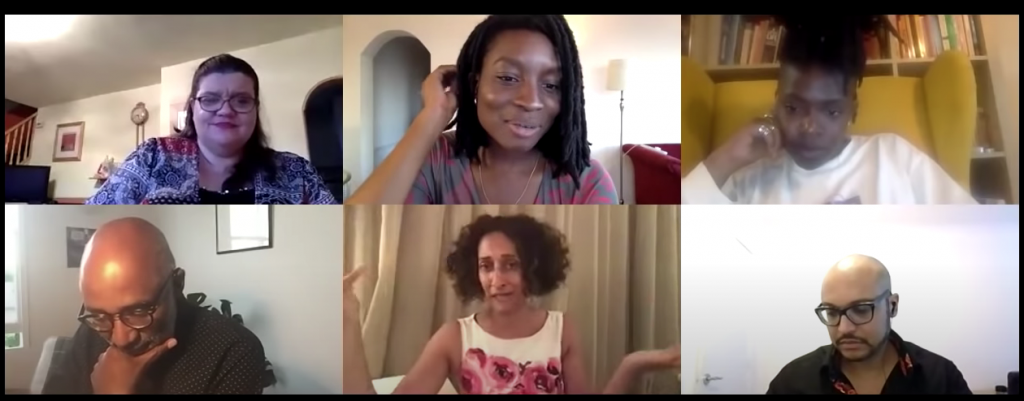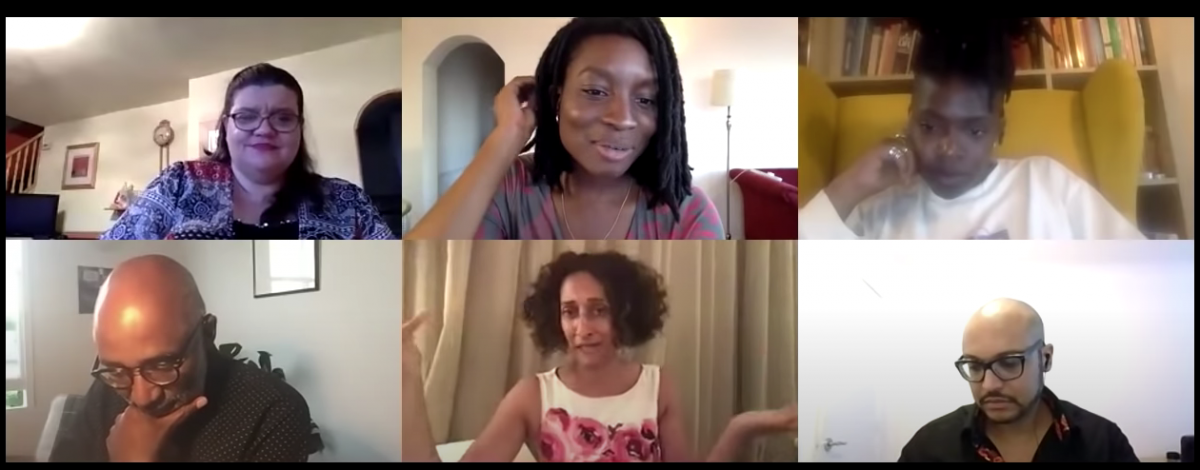
Racial justice and the Common Good
Just as there are different traditions of justice, there are many different ideas on how racial justice and structural change will be achieved. Not all of them can be regarded as ‘Common Good’.
The ‘white fragility’ approach has now attained a fashionable and dominant position, having taken hold across big corporates, mainstream media, the educational fields, many NGOs – and even by some among the churches.
And yet across the political divide there are many who assert an alternative to the identity politics approach to the issue of race. Many leading Black thinkers reject the race-reductionist, postmodern approach of identity politics that focuses on “Whiteness”. They reject it on the basis that it will fail to deliver, that it generates a culture of victimhood, that it will drive further division, and worse, that it is in itself a new form of racism.
Their voices are often excluded or marginalised and so on this page we share material from some of these writers and thinkers, so that you can make up your own mind. The content here is not meant to be exhaustive, but merely to show the range of views.
Those who go along with the iconoclastic and performative gesture politics of “anti-racism” without investigating the underlying ideological dogmas, may inadvertently be colluding with power dynamics that exploit and divide.
A Common Good approach requires a cross-racial, cross-class solidarity to resist the forces that dehumanise. It will involve constructive steps to address structural injustice, but not through shame and coercion. Above all it is about creating a culture of mutual respect, grace and love. The only way to achieve true justice is through the obligations of love which are inseparable from relationships and from God, the source of love.
Watch the British conversation in the video below, or for an American perspective, watch the video discussions at the bottom of the page.
To go deeper, explore the links here:
Anti-racism training
Much of anti-racist training unfortunately draws on Critical Race Theory. Many people influenced by this approach are unaware of the underlying doctrine as it is rarely stated explicitly. It is a worldview at odds with Christianity but many organisations and even churches have been seduced by CRT’s divisive ‘white fragility’ narrative. However, there are alternatives, and we share some here.
Don’t Divide Us, led by Alka Sehgal Cuthbert, is a grassroots, nonpartisan movement of people who first came together in the summer of 2020 to contest the idea that Britain is systematically racist. Following the murder of George Floyd in America, protests spread to the UK and imported a US take on race which didn’t fit the British experience, but was mainly left unchallenged in the media. Don’t Divide Us rejects postmodernist identity politics and its dehumanising and divisive messaging. DDU campaigns against this racialised approach being rolled out across institutions, in particular in schools, in an attempt to protect the progress the UK has made towards being a largely cohesive and successful multi racial society. Follow DDU on Twitter.
The Equiano Project, led by Inaya Folarin Iman is a “debate, discussion and ideas forum. We facilitate conversations about and promote the values of freedom, common humanity and universalism.” Their resources include a podcast and an Introduction to Diversity and Inclusion package (52 pages) free to download here. Inaya convened a UK-US symposium in January 2023 of over a hundred leaders which T4CG was an invited delegate. View a discussion from the symposium here: The meaning of racism and equality with John McWhorter, Trevor Phillips and Alka Seghal Cuthbert. Follow Equiano on Twitter.
Counterweight, led by Helen Pluckrose, is the home of scholarship and advice on Critical Social Justice ideology. You may have misgivings about unconscious bias or anti-racism training, or wonder why they made you feel uncomfortable. Counterweight helps people break down the impact of the ideology in the workplace and offers alternative methods of diversity and inclusion training that are not divisive but which promote love and compassion. Explore their video guides here.
Theory of Enchantment is a training business led by Chloe Valdery serving organisations and workplace environments, centering around a compassionate anti-racism framework combining social emotional learning, character development and interpersonal growth as tools for leadership development. Watch a video of her interviewed here.
The Gratitude Initiative led by Girma Bishaw, promotes a ‘gratitude culture’ in Britain, where gratitude is seen as a vehicle towards both a fulfilled self and a harmonious society. It aims to change the culture one conversation a time, in one community after another, by resourcing and gathering communities to talk about and practise gratitude.
Approaches to racial justice
It is vital to recognise the spectrum of opinion among Black and Minority Ethnic communities. The loudest voices do not represent the majority. Here we intentionally share material that promotes racial justice and which rejects race-reductionist ideologies.
Alka Sehgal Cuthbert The Dangers of the New Anti-Racism
Shelby Steele White Guilt: How Blacks & Whites Together Destroyed the Promise of the Civil Rights Era
Rakib Ehsan Beyond Grievance: What the left gets wrong about ethnic minorities
Remi Adekoya
- Biracial Britain: A Different Way of Looking at Race
- It’s Not About Whiteness, It’s About Wealth: How the Economics of Race Really Work
The Sewell Commission full report via this link
- David Goodhart Game-changer for how Britain talks about race
- Sewell commissioners’ response to criticism here
- Equiano Project detailed response to the Sewell Commission here
Darrell B. Harrison How woke theology is weakening the (Black) church
Trevor Phillips:
- This war has exposed the worst in tribalism (on the Israel-Hamas conflict)
- The ethnic question we’re too scared to ask
- BLM uses race as ‘battering ram to change society’
Susannah Heschel Two Friends, Two Prophets: Martin Luther King Jr and Abraham Joshua Heschel
Batya Ungar-Sargon A New Black intelligentsia is pushing back
Glenn Loury We are fighting for Western Civilisation
Adrian Wooldridge Britain Needs a Fresh and Frank Approach to Race
Tomiwa Owolade
- We don’t build tolerance by obsessing over racial identity
- This is Not America: Why We Need a Different Conversation on Race (book)
Ian Leslie Living Colour: Notes on the Equiano Project
Revd Dr Esau McCaulley:
- the Church is called to point toward a better way of being human
- Discerning Friends from Enemies: Critical Race Theory & Anglicans in North America
- Toward a Black Anthropology and Social Ethic: Why the Humanity and Jewishness of Jesus Matters (video lecture)
- Critical Race Theory, Anglicanism and the Real Crisis
Thomas Sowell
Richard Reeves better to fight for equality on mundane battlefields, not in protests
David Johnston for genuine diversity we must focus on substance not symbols
Howard Thurman Jesus and the Disinherited (book)
Barbara & Karen Fields on racism and equality in America (video)
Revd James Lawson on the civil rights icon John Lewis (video)
Archdiocese of Westminster Being Black and Catholic (video)
Pastor Corey Brooks Police should not allow looting (video)
Michael Lind 1960s Civil rights leaders favoured race-neutral economic programmes
David Mikics Thomas Sowell and the noble lies of today’s race politics
David Goodhart Runnymede Trust’s deeply flawed race report
The Rainbow Coalition of Chicago, 1969 (documentary)
Why should we be cautious about Critical Race Theory and “White privilege”
Matthew Crawford How race politics liberated the elites
Toure Reed Why Liberals Separate Race from Class
John McWhorter
- ‘White Fragility’ is dehumanizing and talks down to Black people
- Woke Racism: How a New Religion Has Betrayed Black America (book)
- the new antiracism religion loses sight of what helps black people
Andrew Sullivan The Cascading Complexity of Diversity
Justin Lee reading ‘White Fragility’ won’t make you anti racist
Jason Riley Critical race theory is a dangerous folly
James Lindsay
- Saying no to Critical Race Theory: an explainer
- The Violence of Decolonisation
- Why you should read Herbert Marcuse’s 1965 essay “Repressive Tolerance”
- Allie Stuckey interviews James Lindsay Critical Theory explained for Christians (video)
- James Lindsay and Helen Pluckrose Cynical Theories (book)
Helen Pluckrose is Critical Race Theory racist?
David Butterfield reviews Cynical Theories
Amna Khalid and Jeffrey Aaron Snyder the problem with “Social Justice Lit”
What’s the problem with ‘race reductionism‘?
Cedric Johnson The Triumph of Black Lives Matter and Neoliberal Redemption
Cedric Johnson Don’t let Blackwashing save the investor class (also podcast here)
Toure Reed Toward Freedom: the Case Against Race Reductionism (book)
Adolph Reed Antiracism: A Neoliberal Alternative to a Left
Barbara & Karen Fields Revisiting Racecraft: The Soul of Inequality in American Life
Joe Hildebrand Obama on ‘activism’ and why left wokeism enables the right
John McWhorter, Coleman Hughes, Sam Harris the black liberal argument against BLM
Sean Cooper the corporate funding behind BLM is shielded from public scrutiny
Giles Udy moral crusade or extremist front? the movement’s revolutionary aims
Watch the discussions below:
This page was created on 25/10/20 and is updated from time to time.

